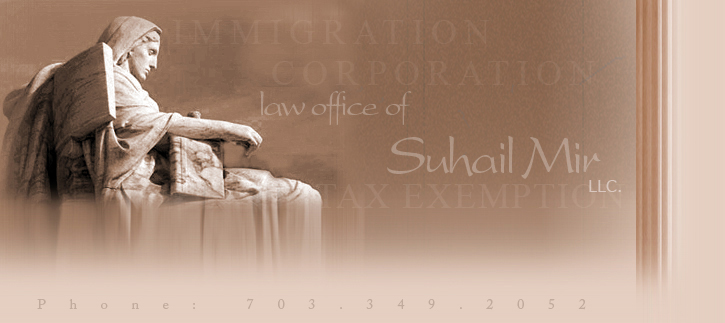
Home Attorney Profile Practice Areas Immigration Corporation Tax Exemptions Consultation Fees Resources Contact
14916 Abilene Way
Woodbrige, VA 22193
Telephone: (703) 349.2052
Fax: (703) 349.6368
suhailmir@hotmail.com
The most common non-immigrant work visas are H visa and L visa. The H1B Visa (Professional in a Specialty Occupation) requires a minimum of bachelor's degree. The foreign worker must possess that U.S. degree or an acceptable foreign alternative. In some cases, a combination of studies and relevant experience may substitute for the degree if it is determined by a credentials expert to qualify the foreign professional.
Specialty Occupation: The H1B status is for foreign workers who will hold specialty occupations. A specialty occupation is one which "requires theoretical and practical application of a body of highly specialized knowledge to fully perform the occupation AND which requires the attainment of a bachelor's degree or higher in a specific specialty as a minimum for entry into the occupation in the United States."
Thus, there are two requirements: First, the employer must demonstrate a need for someone in a specialty occupation as the minimum capability to perform the job; and second, the foreign national must have the required degree, or its equivalent, in a subject closely related to the position.
Under the regulations, the need for a person in a specialty occupation can be shown by one of the following:
Employer's Responsibilities: The employer must first file a "labor condition application" (LCA) with the U.S. Department of Labor in the region where the foreign national will work. The employer must attest to certain wage and working conditions. A list of the attestations on the LCA is provided in the above article entitled "Update on the new LCA form for H1Bs" since a new form for the LCA will be used from January 19, 2001 onwards. We will also describe those requirements, including the complex "prevailing wage" issue, in more detail in a subsequent overview article.
The employer must give notice of the LCA to the relevant collective bargaining unit, if the job is unionized, or otherwise post a notice in a conspicuous location to enable other employees to see it.
The employer must pay certain costs and expenses on behalf of an H1B employee. The employer must also keep certain records. Further details on the above requirements will be included in subsequent overview articles.
Basic Outline of the Process: The first step in H1B cases is to locate “prevailing wage” information for the area in which the employment is to be located. It is possible to have the state issue a prevailing wage determination or, if there is a reputable and reliable published survey that would meet the labor department requirements, to use that instead. The prevailing wage data as well as other basic information is then entered on the LCA form that is submitted to the Department of Labor.
The next step is to submit to the INS a form, along with the LCA, and a letter describing the operations of the company, the job opening, and the prospective employee's background. It is also necessary to document the beneficiary’s degree and to show that the company is viable. A person who is already in H1B status may accept new employment and start working for the new employer immediately upon filing the new H1B petition if the person has: (a) been previously granted H1B status, (b) been lawfully admitted into the US; (c) filed a non-frivolous H1B or other non-immigrant petition which is pending for new employment; and (d) never been employed without authorization in the U.S. before the filing of the H1B petition. Depending upon the location of the employment, it can take 1 to 6 months for the INS to approve the petition.

Home Attorney Profile Practice Areas Immigration Corporation Tax Exemptions Consultation Fees Resources Contact
14916 Abilene Way
Woodbrige, VA 22193
Telephone: (703) 349.2052
Fax: (703) 349.6368
suhailmir@hotmail.com